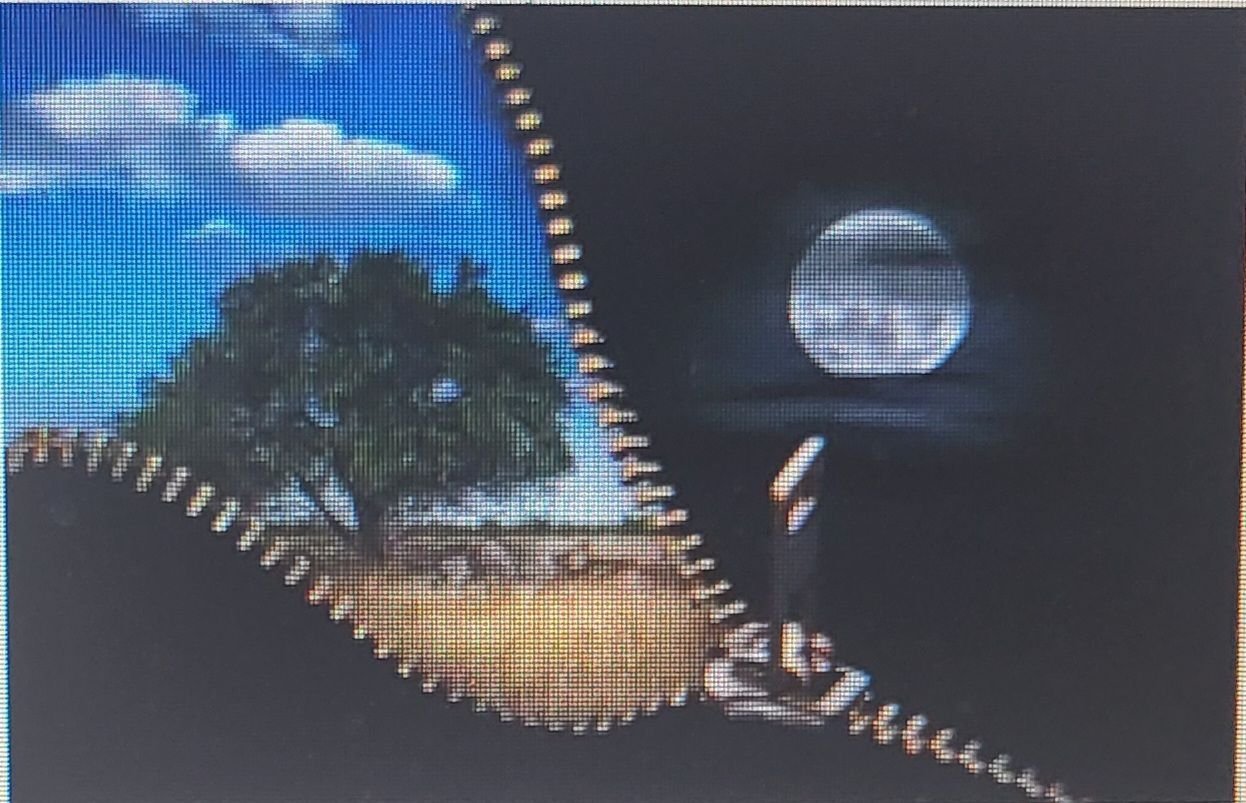Some Profound Advantages for the Soul That May Go Unnoticed When Deprived of Certain Worldly Desires
In The Name of Allah, The Most Merciful, The Bestower of Mercy.
Ubaidullaah Ibn Mihsan Al-Khatmiy narrated from his father that the Messenger, peace and blessings of Allah be upon him, said: “Whoever among you wakes up (in the morning) safe in his property, healthy in his body and has his daily nourishment, it is as if he has been granted the entire world’’.
Al-Allaamah Zayd Bin Haadi Al-Mad’khali, may Allaah have mercy upon him, said:
This hadith shows that those blessed with safety in the lands, physical health, houses to live in and daily nourishment have indeed been blessed with a complete (worldly) blessing. Therefore, it is obligatory to thank Allah constantly.
This hadith shows that what suffice a person’s needs are a bounty and a blessing for which he must thank Allah [The Mighty and Majestic]. A person may strive to gather a lot of wealth; however he was created to worship of Allah [The Mighty and Majestic] in the manner [commanded, legislated] by Allah and His Messenger [i.e. based on what is legislated and commanded in the Qur’aan and authentic Sunnah]. If a person does this, he will achieve and attain success; but if not, he will fail and incur loss. Therefore, is there one who will receive admonition?!
This hadith shows that to be blessed with safety in one’s religion, honour, wealth and blood is (something) valuable. These are among those affairs whose establishment- in a society- will bring about a good life and security. But if security is not present, chaos will unravel in the society – the powerful people will overpower the weak and the oppressor will overpower the oppressed, and thus there will be an evil state of affairs and maybe evil consequences. Any society or land that has been bestowed a ruler among the Muslims and granted security in a region under his ruler-ship, it is obligatory to obey him [i.e. obey the ruler of the land in what is good and not to rebel against him, even if he has shortcomings] and he should be aided by the other lands as much as one is able.
And what is seen as a fact in relation to this (hadith) is that whoever is blessed with enough food and drink, a dwelling place, means of transportation, security in his place of residence and good physical health, it is as if he has been given the entire world. Therefore, he should be thankful to Allah [The Mighty and Majestic] for that until he meets Allah. [1]
Abu Hurairah, may Allah be pleased with him, said that Allah’s Messenger, peace and blessings of Allah be upon him, said: “Look at those who are below you and do not look at those above you, for it is more suitable lest you look down on Allaah’s blessings”. [Sahih Muslim. 2963]
Al-Allamah Salih Al-Fawzan, may Allah preserve him, said:
A person should neither be covetous of this worldly life nor anxious due to what afflicts him, rather he should exercise patience and have hope, whether he is poor, sick or other than that. The worldly life is a place of trial and test, thus one should not become anxious due to calamities and trials. What makes this matter easier for a person is the guidance given by the Prophet, peace and blessings of Allah be upon him, in this hadith: “Look at those who are below you and do not look at those above you, for it is more suitable lest you look down on Allaah’s blessings”.
A poor person should look at the one who is poorer and should not look at a wealthier (person) because if Allah willed He would have placed you in the same situation as that poor person who has nothing. You have something – your daily nourishment; but that one poorer than you has nothing – not even his daily nourishment. You are in a better situation, so praise Allah for this and do not look at the wealthier people because that will lead you to harbour anger against Allah and being displeased with His divine Will, and then saying, “Why can I not be like such and such person; why am not like the wealthy people?” This is the meaning of looking down on the blessing you have. But if you look at the person below you, it will make you thankful because your situation is better than that of many people. Therefore, the one in good health should look at the sick person and then praise Allah for granting him good health. The one who is sick should look at the one who is sicker than him and then praise Allah for being less sick than the person who is sicker than him. This (hadith embodies) a great principle, therefore, “look to the one below you” in wealth, health and in other affairs. [Footnote a]
However, this should not be the case regarding acts of worship. In matters related to acts of worship, you should not look at the one below you. You should not look at the lazy people and those who neglect their religious duties, rather you should look at the righteous and God fearing people so that you can join them in performing good deeds and be similar to them.
Therefore, with regards to the religion, you should not look at the one below you, rather you should look at the one above you in the religion, for why do not want to be like him; why do you not want to be like the righteous people; why do not want to emulate the God fearing scholars? [Footnote b]
If you are a student of knowledge, you should not be satisfied with the sciences of the religion you have acquired; rather you should seek to increase in knowledge as long as you are alive. [2]
————————-
Footnote a:
The Prophet, peace and blessings of Allah be upon him, said: The worldly life is for four types of people. A servant of Allah whom Allah has given wealth and knowledge, so he fears his Lord by way of it. He preserves the ties of kinship and acknowledges Allah’s Rights regarding it. This (type of person) is on the most virtuous position. A servant of Allah whom Allah has given knowledge but not wealth. He is truthful in his intention and says: If I had wealth, I would have done the deed of such and such (person).’ So because of this intention of his, his reward is the same (i.e. the righteous one who has been given wealth and knowledge). A servant of Allah whom Allaah has given wealth but not knowledge. He wastes his wealth out of ignorance. He neither fears Allah nor does he keep the ties of kinship, nor does he acknowledge Allah’s rights. This (type of person) is at the evilest position. A servant of Allah whom Allah has neither given wealth nor knowledge and he says:If I had wealth, I would have done the deed of such and such (person).’’ So by way of his intention, they are similar (i.e. similar to the evil person who wastes his wealth). [Reported by Tirmidhee 2325. Ahmad 18031. Al-Baghawiy 4097]
Al-Allamah Ubaid Bin Abdillah Al-Jabiri, may Allah have mercy upon him, stated: The first is a wealthy person who is thankful (to Allah), thus Allah will raise him to the most virtuous position due to his deed. The second is a poor person who exercises patience. He is truthful in his intention with regards to spending from that which Allah has bestowed on him. Thus Allah makes him reach the most virtuous position due to his truthful intention. The third is a boastful wealthy person. He is covetous and stingy; so his deed takes him to the most evil position. The fourth is a boastful poor person and his intention is evil. So together with his poverty, his intention takes him to the most evil position. Due to this, we know that by way of truthful intentions Allah raises the person and an evil intention debases a person until he finds himself in the most evil position. [An Excerpt from: البيان المرصع شرح القواعد الأربع- pages 8-9]
Footnote b:
Ibn Abee Shaybah, may Allah have mercy upon him, reported in Al-Musannaf and Abu Nu-aym, may Allah have mercy upon him, in Al-Hilya [5/12] with an authentic chain from Abu Muslim Al-Khawlaani, may Allah have mercy upon him, who said: “The scholars are three types: A man who lives with his knowledge and the people live with it alongside him; a man who lives with his knowledge and none else lives with it alongside him, and as for the third man, the people live with his knowledge and it destroys him”. Shaikh Abdullaah Al-Bukhari, may Allah preserve him, stated, “The intent behind this speech: Indeed the first knows, acts and teaches. As for the second, he knows and acts, but does not teach. As for the third, he knows and teaches, but does not act! We ask Allah for steadfastness and well-being”. [المقالات الشرعية– pages: 23-24]
Al-Allamah Siddiq Hasan Khan, may Allah have mercy upon him, said:
The purpose of sciences of the religion in and of themselves is not to earn wealth, but rather acquaintance with facts and refining morals. Therefore, he who pursues knowledge of the religion for the sake of professionalism is not a scholar, but rather he is someone who feigns resemblance to the scholars. The scholars of Transoxiana revealed and stated this when they were informed of the construction of schools in Baghdad; so, they held gatherings of religious knowledge and stated: “The people with lofty aspirations and the pure souls used to preoccupy themselves with it, whose intent or (goal) behind the pursuit of knowledge was because of its nobility and perfection (attained) through it, so they came to the scholars to benefit from them and their knowledge. However, if it becomes a means of earning, the mean (vile) and lazy people will approach it and this will be a reason for its disappearance, thus the sciences of wisdom are abandoned, even though they are noble in and of themselves”. [An Excerpt from “Abjad Al-Uloom” 1/77-78]
Imam Muhammad Ibn Saalih Al-Uthaymeen [may Allah have mercy upon him] said: “Among the people are those who have vast knowledge but (afflicted with vain) desires, and Allah’s refuge is sought (against this)! He issues religious verdicts based on what pleases the people, and not based on what pleases Allah. This one is called the scholar of the Ummah (or the people). The scholars are three types: the scholar of the religion, the scholar of the state (government), and the scholar of the Ummah. The scholar of the religion is the one who propagates the religion of Islam, issues religious verdicts based on the religion of Islam, knowledge, and what the Shariah establishes, and does not care whether it agrees with the desires of the people or not. The scholar of the state (or government) is the one who looks at what the state (or government) wants and issues a religious verdict based on what the state wants, even if that involves distorting Allah’s Book and the Sunnah of His Messenger. As for the scholar of the Ummah (or the people), he is the one who looks at what pleases the people. If he sees that the people are on something, he issues a religious verdict based on what pleases them, then he attempts to distort the texts of the Qur’an and Sunnah to make it agree with the desires of the people. We ask Allah to make us and you from the scholars of the religion who act upon it”. [An Excerpt from “Sharh Riyaadus Saaliheen” 4/307-308]
Shaikh Al-Islam Ibn Taymiyyah [may Allah have mercy upon him] said: When it is case that the true followers of the Prophets [peace and blessings of Allah be upon them] are people of knowledge and justice, therefore the speech of the people of Islam and the true adherents to the Prophetic Sunnah regarding the unbelievers and the proponents of religious innovations has to be based on knowledge and justice, and not conjecture and what the soul desires. And due to this the Prophet [peace and blessings of Allah be upon him] said, “The judges are three: one will go to Paradise and two to Hell. A man who knows the truth and judges with it will enter paradise; a man who knows the truth but judges with the opposite of it will enter the fire, and a man who judges for the people based on ignorance will enter the fire”. [Reported by Imaam Abu Dawud 3573]
When it is the case that the person who adjudicates amongst the people in disputes over wealth, blood (such as murder cases, acts of physical violence, etc.), and honour is (threatened) with entry into hell if he is not a just scholar, then what about the one who makes judgements – without knowledge and justice – on creeds, religions, fundamentals of belief, divine knowledge, and general fundamental principles relating to many subject matters, as is the case with Ahlul Bidah Wal Ahwaa [the proponents of religious innovations and followers of vain desires] who follow ambiguous doubtful matters, abandon those explicitly clear texts that the Prophets have transmitted, cling to affairs that share an ambiguous similarity through mere analogy and opinions, and then present affairs whose differences cannot be reconciled or equated, just as is the case with the unbelievers and all the proponents of religious innovation and followers of desires, who liken the creation to the Creator [i.e. they give the creation the Perfect Attributes that only belong to the Creator], and liken the Creator to the creation [i.e. by describing the Creator with the imperfect attributes of the Creation], and then they put forward an evil similitude for Allah by way of thoughtless and confusing speech. This is because the false religion of the Christians is an innovated [or concocted] religion- innovated after the departure of the Messiah [peace and blessings of Allah be upon him] and altered the religion of the Messiah through it; so they deviated from the Messiah’s [peace and blessings of Allah be upon him] path and remained upon that which they innovated. [Al-Jawaabus Saheeh 1/26-30]
Amr Bin Al-Aas [may Allah be pleased with him] narrated that he heard Allah’s Messenger [peace and blessings of Allah be upon him]saying, “If a Mujtahid gives a verdict according to the best of his knowledge and his verdict is correct, he will receive a double reward, and if he gives a verdict according to the best of his knowledge and his verdict is wrong, even then he will get a reward”. [Bukhari Number 7352]
A Few Points From This Hadeeth:
[I] A Mujtahid is not deprived of reward.
[II] The judgement of a non-Mujtahid is different from that of a Mujtahid. Shaikh Al-Islaam Ibn Taymiyyah stated that the one who speaks about the religion without knowledge and out of ignorance (is guilty of) lying and sinning.
[III] The one who intentionally speaks to oppose the truth is threatened with entry into the fire of hell, as opposed to the affair of the one who speaks based on permissible Ijtihaad, for indeed he strives, fears Allah as much as he is able, desires to seek knowledge as much as he was able, speaks for the sake of Allah, knows the stronger proof and speaks based on that. This person is given two rewards if he is correct, but if he is mistaken, he receives one reward.
[IV] A Mujtahid can be correct or mistaken. [Al-Arba’oona Hadeethaa Fee Usoolil Fiqh. pages 32-33]
Al-Allaamah Rabee Bin Haadee [may Allaah preserve him] said: We do not say that there are people of Ijtihaad amongst ahlul bidah because they are followers of desires, and Allaah and His Messenger have testified to this. The misguided innovator stirs up discord and errs, and then says to you, “This is Ijtihaad”. When Hikmatiyaar and the misguided parties (in Afghanistan) murdered Shaikh Jameel Ur-Rahmaan, they said, “This is Ijtihaad”. They (ahlul bidah) do not fall into an affair of misguidance or a calamity except that they say, “This is Ijtihaad”. This is (tantamount) to diluting Islam, falsehood, misguidance, bidah and confounding truth with falsehood when the mistakes of the (qualified scholars of Ijtihaad)- for which they are rewarded- are placed at the same level with Bidah about which the Messenger declared to be destined for the hell fire. [An Excerpt from ‘Ajwibatul Allaamatush Shaikh Rabee Bin Haadee Al Madkhalee Alaa As-ilah Abee Rawaaha Al-Manhajiyyah page: 20]
Imam Ash-Shawkaanee [may Allah have mercy upon him] said:
We often see a man who holds a belief that aligns with truth and correctness. However, when he speaks to someone who disagrees with him- one who is inclined towards something of the innovated matters in the religion, and especially if that person holds a position of leadership or worldly wealth, not to mention a king, he agrees with him, strengthens, supports and aids him against others. The least in such circumstances is that he would hide what he believes is the truth and show contempt – in the presence of a person from whom it is neither possible to receive harm nor benefit – towards what has become clear to him is the right thing, so, what about someone from whom harm and benefit are possible? This behavior is essentially prioritising worldly things and the life of this world over the religion and the afterlife. If he observed and reflected upon what has happened to him, he would have realised that his inclination toward the (vain) desires of a man, two men, three or more individuals – among those he compliments within that gathering, conceals the truth to be in agreement with them and to gain affection, acquire their possessions, and avoid being isolated by them -is a deficiency in upholding the truth and tantamount to exalting falsehood. If it were not for the fact that these individuals hold a higher position in his eyes than the Lord, he would not have been inclined to their (vain) desires and abandoned what he knows to be what Allah wants and demands from His servants. [An Excerpt from Adabud Talab Wa Muntahaa Al-Adab. Pages 93-95]
[1]An Excerpt from ‘Awnul Ahadis Samad Sharh Al-Adabil Mufrad’ Vol 1. page 335
[2] An Excerpt from ‘Tasheelul il’haami Bi-Fiqhil Ahaadeethi Min Bulooghil Maraam’ Hadeeth Number 1438’ Vol 6′ pages 168-169. Publisher: Daar Al-Imaam Ahmad’ 1st Edition 1430AH – Year 2009]









